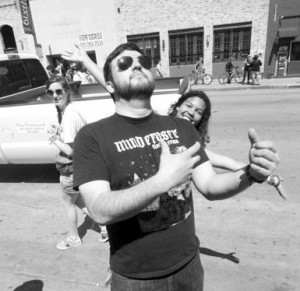
Getting Covered by Music Blogs
This interview was first published in April, 2011. Fred Pessaro is now Editor in Chief of Noisey, Vice’s music component.
Fred Pessaro is a contributing editor at the popular New York City-based music blog BrooklynVegan. Originally from Washington, D.C., Fred got his start in the music industry as a fan of hardcore and punk music and started regularly attending local shows in his hometown at an early age. His interest in freelance writer and photography and his love for music brought him to New York City, where he began to write for and contribute photos to music publications including Fuse, Time Out and Decibel. He has been working with BrooklynVegan since 2007 and is also responsible for booking metal and punk shows sponsored by the blog in the New York City area.

Recently, I had a chance to sit down and chat with Fred about his role at BrooklynVegan and some tips he has for artists that want to get the attention of music publications and get their music out there.
Musician Coaching:
How did you first get started in the music industry?
FP:
I mostly got into it as a fan. I started going to hardcore shows when I was younger. I’ve been into it since I was little. Hardcore and punk rock always affected me, and then as I got older, I started to do some freelance writing. I eventually moved up here from D.C. and started writing for a bunch of different music publications.
Musician Coaching:
When everyone else was listening to Skid Row, I was discovering the Bad Brains and Ian MacKaye awfully late.
FP:
I grew up in that hardcore era of Fugazi. I always did stuff related to music, but it wasn’t until I moved here that I started doing freelance stuff. I did some writing for Fuse and Time Out and had some photos in Decibel and The Aquarian. I was doing BrooklynVegan too, and it eventually became a full-time thing.
Musician Coaching:
Can you describe a little bit more about how BrooklynVegan and your role there came to be? At this point, I know the site is getting 100,000 uniques per month.
FP:
I’m one of the editors of BrooklynVegan, and I do hip hop and metal and punk rock and a good amount of the indie as well. It was started by a colleague of mine. He started in 2004, and I joined on in 2007. I’ve been there longer than anyone else besides him.
Musician Coaching:
A few years in, you’ve clearly contributed to growing an enormous brand in music journalism. To what to you attribute the success?
FP:
I think part of it is moving quickly. Part of it is just instincts and knowing what you like, and knowing what works and what doesn’t work. I think those are the most important things. And you have to be on top of it 24/7, and I feel like I am. It obviously takes a lot less schooling, but it’s kind of like being a doctor. You’re always on call, there’s always something going on, and you have to be prepared for anything. For instance, let’s say for the sake of argument, you and I are talking right now, and Bob Dylan dies. I have to be ready to pull something together quickly. I have to be checking my phone all the time and paying attention to news, etc.
Musician Coaching:
Covering all of music is certainly a big task. And you also do a lot of photography for BrooklynVegan as well, right?
FP:
Yes. I probably shoot at least one show per week. A lot of times I’ll do more than that. In addition, I also book a good number of metal and punk rock shows in the New York area. Those fall under the BrooklynVegan banner also.
Musician Coaching:
I’m sure a lot of musicians hear you get a lot of traffic or already know you are a prominent music blog and think, “I want to be on the cover.” Is there an approach you’ve seen multiple times from different musicians that either rubs you the wrong way or is simply ineffective?
FP:
I think one thing about me and about BrooklynVegan in general is that our mailbox is our battlefield, as I think is the case for most people in music. I tend to get a lot of press releases. I think a lot of musicians and other people have a tendency to think, “Press releases is where you get all your information.” I don’t really get information from press releases. But I think if you’re going to be a good news organization ad know what’s going on, you have to be ahead of the press release. You have to know what’s coming up, and to me, a press release should be a validation of what you’ve already done. A lot of times, people send multiple emails to me saying, “Have you seen this yet? Have you done this yet?” Unfortunately, I can’t respond to every single thing that comes to me, because it’s a large task.
Sometimes people find my email and email me directly. That’s nice and all, but at the same time, the chances of me finding that personal email is kind of hard, because my inbox is so big. A lot of times, because of the massive amounts of emails and promos I get, the thing that helps the most is to have a product that’s going to stand out. If you’re going to hand me a promo, make sure it’s a promo I’m going to remember and not just a CD in a jewel case or something similar. There have been many times I’ve gotten something like that, and then I put it in my bag and forgot about it. And then a week later, I realized, “Oh yeah. There was this great band I wanted to listen to.” But I just forgot it was in there because it didn’t stand out to me at that moment.
Musician Coaching:
Can you cite an example of something that did stand out?
FP:
Here’s a great example. I know these guys well now, but there’s a label called Seventh Rule Recordings. The guy who runs it sent out demos of his band Millions. Instead of giving me a CD, he took a 5 1/4-inch floppy disk an ran a razor blade across the top of it and put the CD inside it. So, it looked like he was giving me a floppy disk from the 80s, but there was music inside it. When I see that, the first thing I think is, “Wow. This is so creative. The music is probably interesting too.” That’s the kind of thing I look for, and I think it’s an important thing for musicians to do. There are so many bands, and I get so many one-sheets that say, “Sounds like Animal Collective” or “Sounds like Coldplay, Broken Social Scene, or My Morning Jacket,’ etc., etc. That’s all well and good, and it’s fine if you want to sound like something else. But I think what attracts me the most is something that’s different and forward thinking and creative. That’s one of the reasons that disk in particular was really cool. I thought, “Someone that cares this much about their packaging is probably going to care this much about their art.”
Musician Coaching:
You mentioned that you don’t necessarily get your information from press releases. I realize you’re a guy who is very much in the mix with a lot of peers and probably a lot of people you know who are out as much or even more than you are to source stories. Where do you get stories from artists? And are there other sources you think are essential for young bands to know about that can help get them noticed before they are at a stage where they can go to a larger music blog like yours?
FP:
I just had a conversation with someone the other day about this. I’m old school, so when I grew up listening to hardcore – and I still apply this concept today, and I think it works really well with any kind of music – the way I learned about music was by going to a show and seeing a band I loved. This band may have been on X label, and I would say, “I respect that label. I think that label puts out consistent material. I’m going to look and see what this is about.” Or, I would say, “Oh, look. That band is wearing this other band’s t-shirt. I think he’s a great guitar player, and he speaks to me. I’m going to check out this other band.” I’ve always approached things in that old school, punk rock way.
Musician Coaching:
It seems you’re saying it’s really the association from musician to musician, and that the organizations around them are much more important than some people might think.
FP:
I think that’s important. But one of the things I also think is important is just getting out there and playing. People who just get out there and play as much as they can do well. For instance, I book a lot of metal shows in the city, and I notice who plays a lot. Any band that plays a lot, whether it’s the first band, the second band or are in some other position on the bill probably has a strong work ethic. Any band that will play anywhere, at any time is probably a band that really wants to work. And it’s probably a band that, even if it’s not good now, will have the work ethic to be good later on.
Musician Coaching:
Do you have any parting advice for musicians trying to get noticed in an age where there are just so many bands and so many blogs? Is there one good strategy?
FP:
I think if you’re a young band today, the best thing you can do is put together a record and give it away for free. Let as many people hear it as possible. I think that’s important on the recorded front and the live front. Any time someone asks you to play a show, you should take it. If you’re a Twee band, and someone asks you to open for a metal band, play it anyway. If you’re playing first on a 12-band bill at 3 p.m., play it anyway. At the end of the day, playing the show is important, whether there are five people there or 5,000 people there. But it’s also important that your name is on a show, and your name is repeated as many times as it can be repeated. If I were a young band, I would play anywhere and everywhere as often as I could, and I would give away my music to anyone that would hear it. Also, maybe you can do something like print up t-shirts with a catchy design that someone might wear whether they liked your band or not. And sell them at cost. Basically, the more times someone sees your name, the easier it’s going to be for them to recognize it down the road. It’s the idea of conditioning. The more times you mention a name, the more the name will become a part of everyone’s consciousness as opposed to “just another band out there.”
To sum it up, play as much as you can, record as much as you can and give it all away for free until you think people are listening, and then you can draw back on part of that.
To learn more about Fred Pessaro and read about some of the bands and events he’s covered, visit the BrooklynVegan website.






